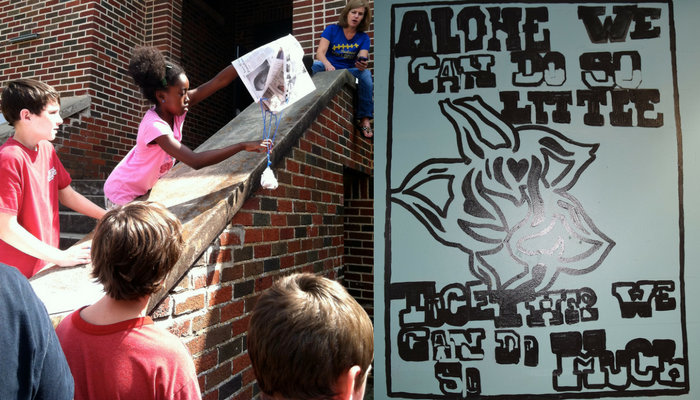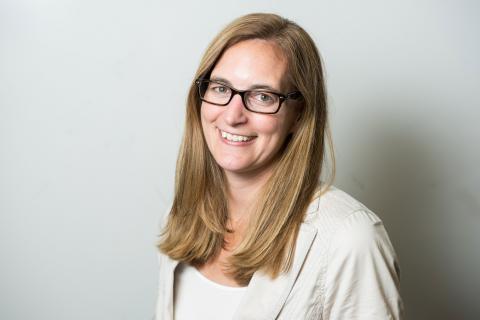New Designs for School
When Projects Are Personalized, Learning Is Social
Topics

We’ve all had the experience of truly purposeful, authentic learning and know how valuable it is. Educators are taking the best of what we know about learning, student support, effective instruction, and interpersonal skill-building to completely reimagine schools so that students experience that kind of purposeful learning all day, every day.
Project-based learning doesn't have to be at the expense of learning basic skills and content knowledge. Here are 3 instructional approaches to do both.
This post originally appeared on Education Week's Learning Deeply blog on January 4, 2017.
Learning is social, even when it's personalized. It sounds contradictory, but it's true.
Personalized learning is all about putting the student at the center of their learning experience, with a laser focus on the specific strengths, needs, interests, and goals of each student. But that doesn't mean that students are isolated from their peers, their teachers, or the world around them. In fact, meeting the individual needs of a student actually requires and depends upon a strong degree of social interaction.
This is the thinking that's motivating some schools to personalize learning by taking advantage of the social aspects of project-based learning (PBL). PBL requires students to practice social skills like collaboration and communication. It also requires students to figure out how their individual learning goals fit within and are advanced by their engagement with the world around them. In this way, PBL helps students develop a richer, deeper, more personally-meaningful set of outcomes.
Schools that integrate personalized learning and social interaction through PBL use one or more of these three instructional approaches:
1. Personalizing Project-Based Learning
The movement to a more student-centered learning experience is shifting the experience of PBL even in schools with a long history and deep roots in PBL. As Andrew Miller describes, personalized—or student-designed—PBL enables students to start with their own driving questions, design projects themselves, identify the standards they will incorporate, set deadlines and move at their own pace, and select the product they will create to demonstrate their learning. Personalized PBL is powered by student agency and the ability to tackle authentic problems with their peers. It activates their curiosity and motivates them to engage deeply in their learning.
Magnolia Montessori For All in Austin, Texas, is employing the Collaborative Research Cycle to individualize project-based learning. Small groups of students identify a research topic and how they will share what they discover with the world. To conduct the research, students often plan a field study excursion, an essential aspect of Montessori programs. They plan the trip—for instance, to visit the library, an art gallery, or a local expert—by themselves and develop resourcefulness and self-confidence as they navigate the world beyond their school walls.
Fullerton School District in California cemented its commitment to personalized projects through iPersonalize, an augmented reality game developed by district personnel that provides self-paced, quest-based learning experiences. Students team up, earn experience points, and "level up" when they master a learning goal. Their individual progress is tracked using leaderboards and badges. One student explains, "I liked how we could build teamwork and improve ourselves in our classroom and then spread that to the entire world!"
2. Supplementing Project-Based Learning with Personalized Skill Development
Educators Sherre Vernon, Nicole Tempel Assisi, and Jaclyn Vasko from Thrive Public Schools recognized that PBL alone "is not enough."
Instead, they overlay a mapped-out project plan with a parallel, interconnected plan for students to master a set of related discrete skills. Blended learning through rotations of small group instruction, hands-on workstations, and targeted online learning provide the "short bursts of direct instruction, peer-practice, and iteration" that are more efficient at developing students' fluency in literacy and numeracy. This basic knowledge and skill development is also more efficient, and more engaging, because it is tailored to students' prior achievement and needs.
Similarly, although PBL is a defining instructional approach of the EL Education model at Two Rivers Public Charter School in Washington, D.C., students master most of their core math content through inquiry-based lessons utilizing problem-based tasks rather than projects. The problem-based tasks have multiple entry points to ensure that all students can access the same concepts and students have the opportunity to solve the problem task in different ways.
Educators designing personalized skill development experiences to supplement PBL can use the learning design tools developed through Next Generation Learning Challenges' MyWays research project. These tools are grounded in David Perkins' whole game learning model, demonstrating how PBL can extend into core skill practice, or as he refers to it, "working on the hard parts."
3. Engagement with a Designed World
When maker-based or community-based learning is infused into PBL, the opportunities for more personalized engagement with real-world challenges abound. Aaron Vanderwerff of Lighthouse Community Charter School vividly articulates this personalized engagement:
As students become more aware of the design of the world around them, they begin to see themselves as people who can affect that design and are also empowered to actually do the work—to tinker, hack, and improve design. This newfound awareness isn't limited to objects, but can move into the core curriculum as well, through discussion of the design of governmental systems, cell structure, or a poem.
This approach to PBL opens the door for the kind of agency that disadvantaged students need to "navigate and negotiate a world that is hostile to their very existence," as Matthew Riggan of the Workshop School argues. When students can recognize that they live in a designed society, they can activate their resilience to achieve some success within the current design, and they can activate their agency to change the systems and structures that marginalize specific communities based on race, class, and other social identities.
The Workshop School is a non-selective district PBL high school in Philadelphia, with social-action projects where students work to improve their world (see the Food Truck and Lighting 52nd Street projects).
Another PBL school, New Tech High in California, started this school year with a three-day schoolwide design challenge so that students were involved in figuring out answers to the guiding question, "How might we develop positive solutions to promote a culturally responsive community?" As a school community, they examined cultural identity, defined culture in society, and designed actions to create a more culturally responsive community at New Tech High.
When schools embrace both personalized learning and social engagement in any of these three approaches to PBL, they welcome a student's identity and their unique life experiences and curiosities into the learning, which helps build their foundational knowledge and skills efficiently, and solve problems that are personally meaningful.
And in a beautiful, authentic spiraling, students give new shape to the world around them: the environment and creatures of the physical world, the people and institutions of the social world, and the objects and ideas of the constructed world.




